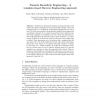Free Online Productivity Tools
i2Speak
i2Symbol
i2OCR
iTex2Img
iWeb2Print
iWeb2Shot
i2Type
iPdf2Split
iPdf2Merge
i2Bopomofo
i2Arabic
i2Style
i2Image
i2PDF
iLatex2Rtf
Sci2ools
171
click to vote
ECMDAFA
2008
Springer
2008
Springer
Towards Roundtrip Engineering - A Template-Based Reverse Engineering Approach
Model driven development suggests to make models the main artifact in software development. To get executable models in most cases code generation to a "traditional" programming language like e.g. Java is used. To obtain customizable code generation template-based approaches are applied, commonly. So, to adapt the generated code to platform specific needs templates are modified by the user. After code generation, in real world application the generated code is often changed e.g. by refactorings. To keep the code and the model synchronous reverse engineering is needed. Many approaches use a Java parser and a mapping from the Java parse tree to the UML model for this task. This causes maintenance issues since every change to a template potentially results in a change to this parse tree - model mapping. To tackle this maintenance problem our solution does not use a common language parser but uses the templates as a grammar to parse the generated code, instead. This way changes t...
Related Content
| Added | 19 Oct 2010 |
| Updated | 19 Oct 2010 |
| Type | Conference |
| Year | 2008 |
| Where | ECMDAFA |
| Authors | Manuel Bork, Leif Geiger, Christian Schneider, Albert Zündorf |
Comments (0)

